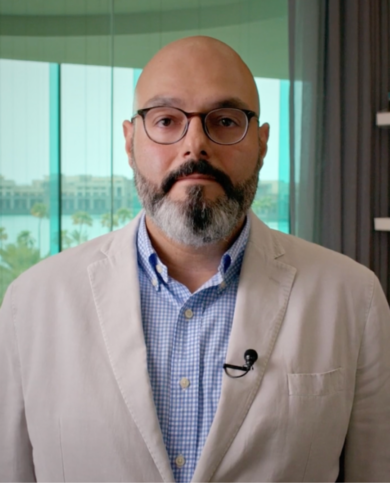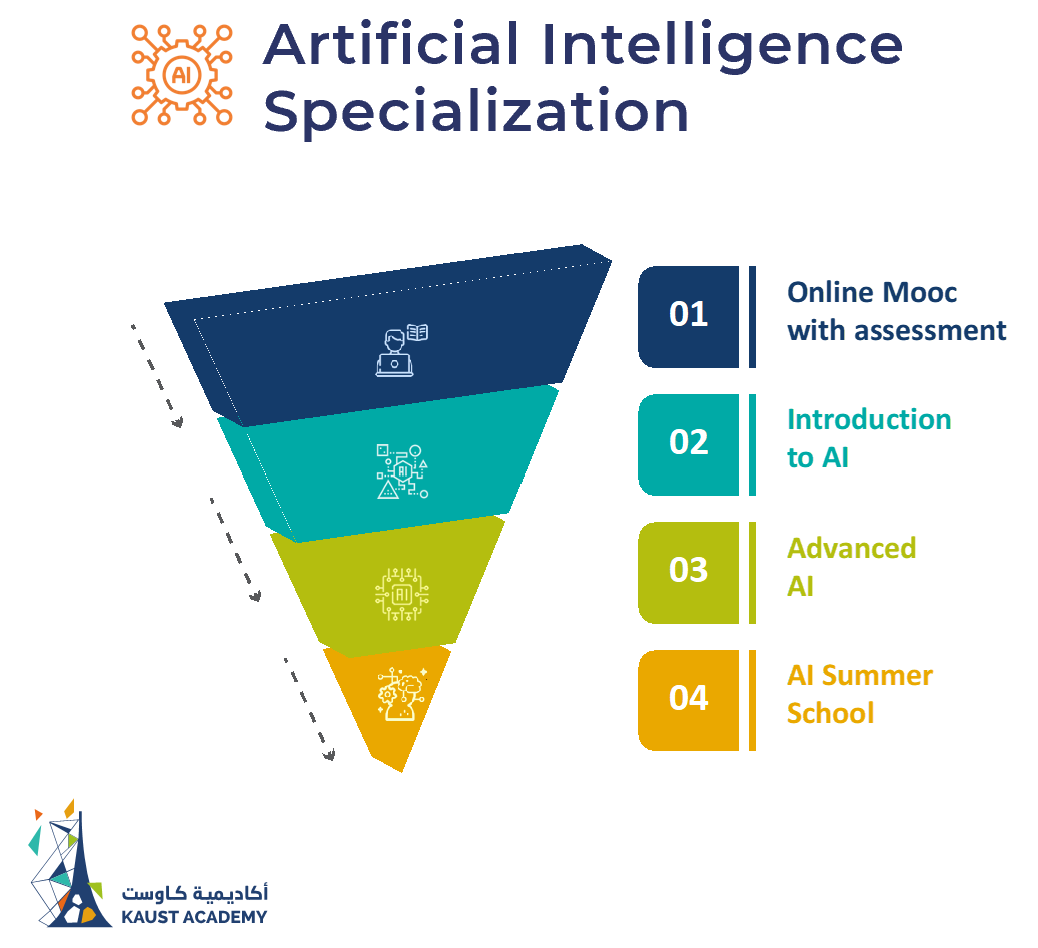Artificial Intelligence
Specialization
The Artificial Intelligence Specialization is a multi-level program offered to Saudi universities students and recent graduates. The program consists of four stages with assessment after each stage to get qualified to the following one. The program covers the field from the fundamentals to the advanced levels of AI technology with capstone projects showcasing the acquired knowledge.
- You must be a university student currently enrolled in a university, or recently graduated within two years.
- The accepted applicants’ age range is between 18 and 30, inclusive.
- You must complete the prerequisite courses on Coursera.
- Passing the assessments at each stage. Top qualified students will be invited to the next stage.
The registration will open soon!
Eligible candidates will be invited to the placement test.
To be eligible for the placement test, the candidate must be enrolled in the KAUST Academy/Coursera program within 3 days of receiving Coursera invitation and then complete the required pre-requisite courses within the recommended period, otherwise the Coursera subscription will be revoked and passed on to other applicants on the waiting list.
*Compulsory Step
Prerequisite Core Courses
To qualify for the Artificial Intelligence Specialization Program, you’ll need to sign up for Coursera within 5 days of receiving the invitation link at your registered email address, and then successfully complete one of two tracks to be eligible to take part in the placement test:
Prerequisite Courses of Artificial Intelligence – Python Basics
Prerequisite Courses of Artificial Intelligence – Mathematics
Students with top scores in the placement test will receive invitation for (Introduction to AI) to join a one week in person training during university breaks. At the end of the course, students with top performance will be invited to another one week in person training (Advanced AI) and take an exam at the end of the course as well.
The top qualified students will receive invitation to participate in a variety of KAUST Academy Summer Programs at elite partners institutions in KSA and/or abroad including Summer School, Internships, and Research Programs.
Students who will not be selected after passing the placement test in December, will still have access to over 200 courses, specializations, guided projects and more on Coursera until August 2026. They will be eligible to receive a free certificate for each achievement on Coursera during that period.
Covered topics
in this course
- Mathematics for Machine Learning and Datascience
- Python Programming Skills
- Basic machine learning
- Computer Vision
- Graph Neural Networks
- Natural Language Processing
- Deep Unsupervised Learning
- Reinforcement Learning
- Applications of AI in Physical Sciences
- Additional courses on core skills, innovation and leadership
Skills you’ll gain
- Computer Vision
- Machine Learning
- Linear Algebra
- Optimization
- Deep Learning Libraries
- Large Scale Deep Learning
- Python Programming
- Artificial Intelligence Applications
Student Journey
Stage 1: Prerequisite Course
Important Note: Signing up for the prerequisite courses on Coursera (Stage 1) does not guarantee participation in subsequent stages. Students must demonstrate their knowledge and skills by excelling in the assessments to progress through the program. Certificates of Completion will be awarded at each stage to acknowledge participants’ achievements. Qualified students will be invited to the next stage.
Duration: 3 to 5 Weeks Completion Date: Early November Method: Self-Paced, Online Courses
Description: The students are required to complete one of 2 dedicated specializations (Python 3 Programming Specialization, Mathematics for Machine Learning and Data Science Specialization) and several courses that will supply them with the knowledge for machine learning and artificial intelligence, including basics of linear algebra, calculus, optimization, and Python Programming.
Stage 2: Introduction to Artificial Intelligence
Duration: 5 Days Start Date: During university breaks 2025/2026 Method: Instructor-Paced, In-Person Lectures
Description: The qualified students will learn classical machine learning tools, including linear regression, logistic regression, support vector machine. The students will also be introduced to neural networks, deep networks, and deep learning libraries including PyTorch. Qualified students will be invited to the next stage.
Stage 3: Advanced AI Course
Duration: 4 Days Start Date: During university breaks 2026 Method: Instructor-Paced, In-Person Lectures
Description: The qualified students will learn about convolutional neural networks and their applications of convolutional neural networks to computer vision applications, including image classification, segmentation, and object detection. Qualified students will be invited to the next stage.
Stage 4: AI Summer Program
Duration: 8 Weeks Start Date: June, 2026 Method: Instructor-Paced, In-Person Lectures
Description: Qualified students will be invited to the prestigious KAUST Academy Summer Program in one of KAUST Academy top partner institutions in KSA or abroad. Students will be provided with on campus accommodation and privileges.
The students will learn about the following areas of Artificial Intelligence.
- Computer Vision
- Reinforcement learning
- Natural language processing
- Deep Unsupervised Learning
Recommended Agenda for Stage 1
Below you can find a recommended agenda to complete the pre-requisite courses to be invited to the placement test and advance in the program.
Professor’s Take
on the Course
“Artificial intelligence isn’t just a buzzword; it’s the cornerstone of our future. The potential for AI to revolutionize industries, drive economic growth, and enhance the quality of life is unparalleled. At the AI Initiative, we are committed to bringing the best research, facilities, and products to the Kingdom. Our collaborations with global leaders and institutions ensure that we remain at the forefront of AI research and development.
Our mission isn’t just about technology; it’s about nurturing local talent to sustain our progress. We are partnering with KAUST Academy in providing programs that are meticulously crafted to educate and empower Saudi students with the skills needed to not only keep up with the rapid advancements in AI but to drive innovation themselves. By fostering a vibrant AI ecosystem, we’re ensuring that the Kingdom remains a frontrunner in the AI race”
Professor Bernard Ghanem
Chair of KAUST Center of Excellence on Generative AI (GenAI)

Frequently Asked Questions (FAQs)
Saudi students and recent graduates in Saudi universities majoring in science and/or technology relevant fields.
By signing up and completing the prerequisite (online) courses via Coursera.
The program is currently offered with a full scholarship for talented students at all Saudi universities.
No, this training program is catered to Saudi students and recent graduates in Saudi universities to well prepare them for the ideal career opportunities in the Kingdom and/or abroad.
Absolutely. The course emphasizes practical programming and covers foundational concepts that are applicable to real-world AI solutions.
(Stage one) Prerequisite online course is self-paced, suggested completion time is 3 to 5 weeks.
(Stages 2, 3, and 4) Introduction, Advanced, and Summer Program) are full day in-person training and instructor-paced. They will will take place during university breaks.
To qualify for the placement test, you are required to successfully complete only the pre-requisite course(s) which are auto-enrolled to your access upon joining Coursera.
Yes, participants who successfully complete the online course(s) and/or the in-person courses will receive a certificate of completion to showcase their newfound knowledge and skills at each stage.
The program consists of four stages with assessment after each stage to get qualified to the following one. Top performing students will be selected to advance further until they successfully reach the summer program.
Students who successfully complete the pre-requisite courses on Coursera will be already benefited from this program even if they do not get selected to the second stage.
Do not forget that you have free access to over 200 courses, specialization, guided projects, and more through the KAUST Academy/Coursera license.
We strongly recommend that you enroll, complete and earn free certificates for as many courses as you like, during the entire period of the program.
- Question: In Python, if you create a new list b as a clone of list a using slicing (b = a[:]), which of the following statements is true?
- a and b are the same list, and any modification to a will also reflect in b.
- a and b are different lists, but they share the same memory address.
- a and b are different lists, and modifications to b do not affect a.
- a and b are different lists, but modifications to a will still affect b.
Answer: C
- Question: The Hessian matrix of a function f(x, y) is a matrix of:
- First partial derivatives of f with respect to x and y
- Second partial derivatives of f with respect to x and y
- Mixed partial derivatives of f with respect to x and y only
- Derivatives of f with respect to time
Answer: B
- Question: Which line correctly writes a list athlete = [“John”, 28, “Basketball”] as a CSV row?
- write(“,”.join(athlete) + “\n”)
- write(“,”.join([str(item) for item in athlete]) + “\n”)
- write(“Name, Age, Sport\n” + athlete + “\n”)
- writelines(“,”.join(athlete))
Answer: B
- Question: If class Dog inherits from class Animal, which of the following statements is true?
- Dog can access all methods and attributes of Animal.
- Animal can access all methods and attributes of Dog.
- Instances of Animal can call methods defined only in Dog.
- Dog and Animal have no relationship unless explicitly specified in each method.
Answer: A
- Question: If the correlation coefficient between two variables X and Y is -0.85, which of the following is true?
- X and Y have a strong positive relationship.
- X and Y have a weak negative relationship.
- X and Y have a strong negative relationship.
- There is no relationship between X and Y.
Answer: C
- Question: Given two lists, names = [“Alice”, “Bob”, “Charlie”] and ages = [25, 30], what will list(zip(names, ages)) return?
- [(“Alice”, 25), (“Bob”, 30), (“Charlie”, None)]
- [(“Alice”, 25), (“Bob”, 30), (“Charlie”, 0)]
- [(“Alice”, 25), (“Bob”, 30)]
- [(“Alice”, 25), (“Bob”, 30), (“Charlie”, “Unknown”)]
Answer: C, Explanation: zip stops at the shortest list, so “Charlie” is ignored.
- Question: Which feature scaling method is equivalent to calculating the z-score (standardizing to have mean 0 and standard deviation 1)?
- Min-max scaling
- Robust scaling
- Standard scaling
- None of the above
Answer: C
- Question: Why is the characteristic equation of a matrix important in linear algebra?
- It determines if a matrix is invertible.
- It is used to calculate the eigenvalues of the matrix.
- It finds the trace of the matrix.
- It checks if the matrix is symmetric.
Answer: B
- Question: You have a DataFrame df with columns [‘Category’, ‘Sales’]. Which command will give the average Sales for each unique Category?
- groupby(‘Category’).mean()
- groupby(‘Category’)[‘Sales’].mean()
- groupby(‘Category’)[‘Sales’].average()
- groupby(‘Category’).count()
Answer: B
Contact us for more information
